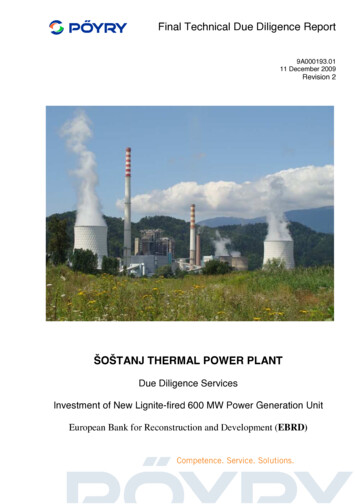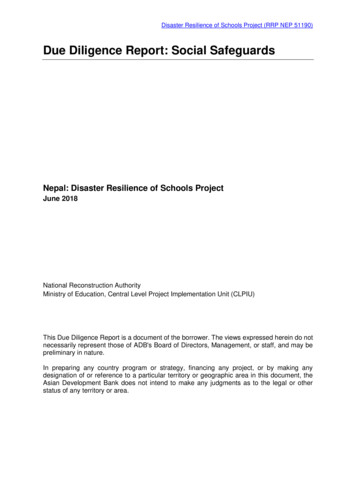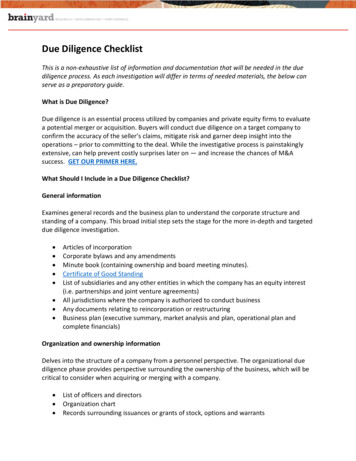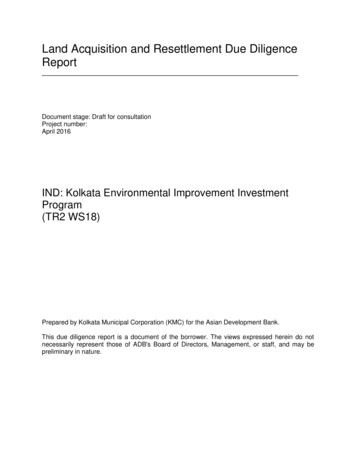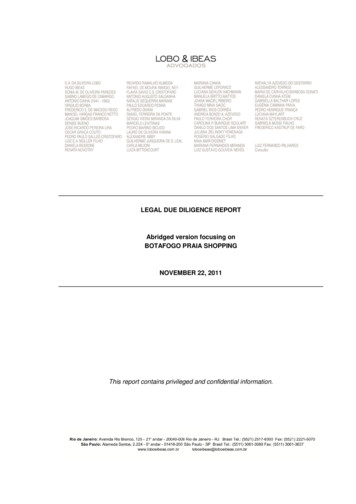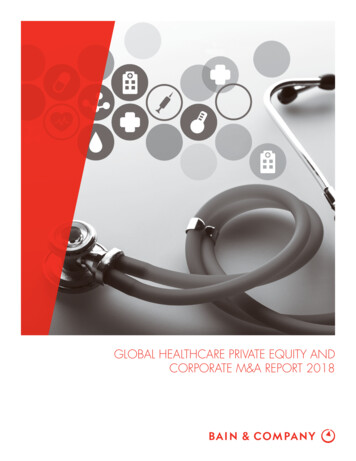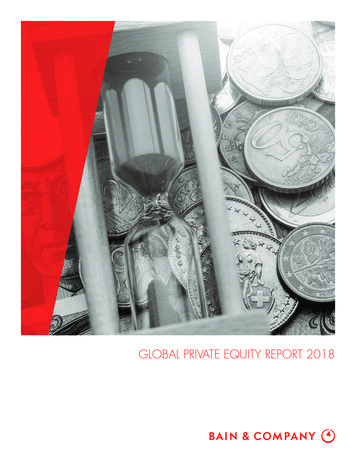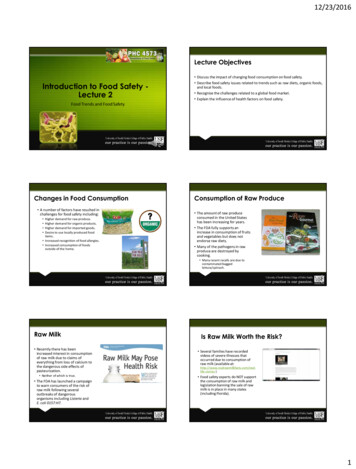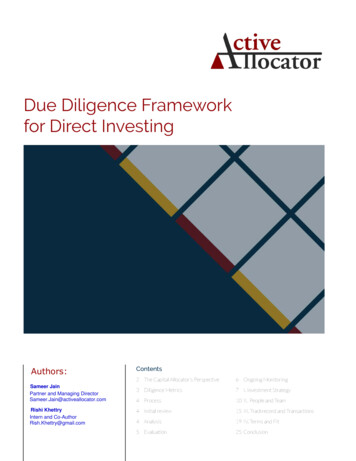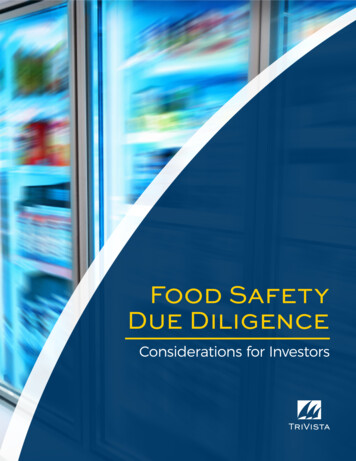
Transcription
Food SafetyDue DiligenceConsiderations for Investors
Investments in the Food & Beveragesectors have helped many privateequity investors realize sizeablereturns. However, investmentprofessionals must keep Food Safetyregulations and compliance top ofmind during due diligence and posttransaction to preserve capital andmitigate risk.Private equity investment activity in theFood & Beverage sectors continues toincrease substantially, particularly in themiddle market. Entrepreneurs seekinggrowth capital and liquidity havepresented investment opportunitiesthat are ripe for investors, while alsoallowing for ample exit opportunitiesto larger funds and strategic buyers.However, investments in the Food &Beverage sectors come with unique risksthat are not encountered in traditionalmanufacturing and distributionenvironments.FOOD SAFETY DUE DILIGENCEConducting Food Safety Due Diligence is onecomponent of a broader diligence effort. In additionto conducting traditional Operational Due Diligence,investors need to understand that there are criticalelements of a comprehensive Food Safety Programthat must be assessed, including Product Safety,Regulatory Compliance, Management Commitment,and the target’s company-wide Food Safety Culture.While an operation may have various food safetycertifications, these auditing schemes tend to focuson documentation without considering other, morecomprehensive elements to product protections.Food Safety Programs must be well-developed andcompliant, and a top-down Food Safety culture thatfosters employee empowerment can lead to effectiveimplementation of those programs. It is recommendedthat trained experts be retained to evaluate the2www.trivista.com Food Safety Due Diligenceapplication of the Food Safety and CompliancePrograms as an independent review of adherence toindustry best practices.Determining early-on whether or not a targetcompany is compliant with the FDA, USDA, state orother international industry regulations is critical tomitigating downside risk. While no production facilityis ever deemed “perfect,” it is important that investorsconsider gaps that exist in the target company’sFood Safety Program. Additionally, it is essential tounderstand the potential liability and probability of aproduct recall or regulatory sanctions – either of whichcould dramatically impact an investment. Mapping outa post-close risk mitigation and improvement plan thatcan be shared with management will ensure timelyclosure of critical corrective actions and demonstrateto management the investors’ commitment to FoodSafety and Compliance.
FDA Food Product RecallsSource: FDA EnforcementReports (www.fda.gov)Primary Drivers of FDA Recalls ‘17 to ‘19Food Safety Due Diligence www.trivista.com3
GLOBAL SUPPLY CHAINFood Safety DueDiligence Checklist:In addition to ensuring an operation is in regulatorycompliance and has a robust Food Safety Program inplace, there are supply chain and ingredient factorsthat must be assessed. Certain ingredients and finished Good Manufacturing Practices (GMPs)ingredients being sourced internationally, regulators HACCP (Hazard Analysis & Critical Control Points)have been paying increased attention to both Microbiological Programsintentional and unintentional adulteration of these Allergen Controlingredients. For example, a Foreign Supplier Verification Foreign Material ControlProgram (FSVP) must be in place for FDA-regulatedproducts. This program places responsibility on US food Sanitationimporters and manufacturers to assess and mitigate Supply Chain Managementthe risks involved with their imported ingredients. Traceability & Crisis Management Food Defense Plant Infrastructure & Equipment Conditions Pest Control Corrective & Preventative Action Program Personnel Training Regulatory Communications Third-Party AuditsFDA: FOOD SAFETYMODERNIZATION ACTThe FDA’s Food Safety Modernization Act (FSMA) shouldbe of critical concern to private equity investors activein the Food & Beverage space. Since being signedinto law in 2011, FSMA has been rolled out in stages.However, Food & Beverage operations have struggledto interpret and implement the new regulations, andmany are still not compliant. FSMA compliance extendsoutside of the boundaries of the US, and severalcountries around the world have adopted similarregulations. Mid-market and small-cap companies maybe at a significant disadvantage with the regulatorycompliance movement, since they often lack the basicscience and technological expertise to stay out in frontof the changes required.4products have inherent risks, and with so manywww.trivista.com Food Safety Due Diligence
“The United Statesimports about 15% ofits overall food supply.But this increasinglyglobalized and complexmarketplace has alsoplaced new challengeson our food safetysystem” — FDA, 2019POST-TRANSACTION PORTFOLIOCOMPANY OVERSIGHTAssessing a company’s current programs andimplementation does not always ensure futureadherence or commitment to a comprehensive andeffective program. To that end, private equity investorsshould also consider the management of Food Safetyand Compliance Programs post-close.Investors should monitor performance, and themanagement of Food Safety Programs should beregularly scrutinized, especially with respect tochanging regulations. Investors must empowermanagement teams to invest time, money, andresources into their Food Safety infrastructure, whichFOOD SAFETY AT EXITmay require capital expenditures and external advisoryThe final consideration for private equity investorsservices.investing in the Food & Beverage sectors is the impactFood Safety is a constantly evolving field that needsFood Safety can have on the exit process. Investing into be regularly monitored and re-assessed to ensureeffectiveness. Staying ahead of the curve will guaranteethat risk has been mitigated and that the organizationis adequately positioned to prevent recalls or othercostly regulatory and compliance issues.the right resources during an investment hold periodshould net tangible results. While it would be difficultto estimate the net positive impact of a robust foodsafety program on enterprise value, having a plan inplace to tackle every element of Food Safety shouldenable a faster deal process, higher likelihood of close,and potentially higher exit multiples.Food Safety Due Diligence www.trivista.com5
CONTACT USGustavo RojasManaging k CiotoliManaging na SerkowskiManaging bout TriVistaTriVista is an operations, supply chain,and IT consulting firm that providesoperational due diligence to privateequity firms, and performanceimprovement support to operatingcompanies. As private equity’s leadingadvisory firm focused on operationsand supply chain, we’ve partnered withthe world’s top investors and executiveleadership teams to transformbusinesses and drive enterprise value.Learn more at http://trivista.com.
operational due diligence to private equity firms, and performance improvement support to operating companies. As private equity’s leading advisory firm focused on operations and supply chain, we’ve partnered with the world’s top investors and executive leadership
